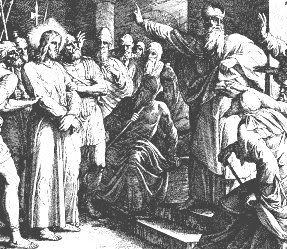Periodically, I re-post articles from the past to encourage those who practice Biblical evangelism. This one I include in my 10 week class. I hope you find this helpful:
Even though there is a wealth of evidence from Scripture, history, and the great teachers of the past (including Jesus, Paul, Peter, Martin Luther, Wesley and Spurgeon) in regard to the efficacy of using the 10 Commandments in a Gospel presentation, you will still face the greatest opposition when sharing your faith in this way from… Christians!
Yes, Christians.
Some of the most difficult people to reason with are religious people, people of faith… nay, followers of Christ.

Make sure that when you share this Biblical principle of using the Law with a believing friend that you remain reasonable. Don’t fight. Don’t argue about it. Remain calm. Take a deep breath and… let them listen to “Hell’s Best Kept Secret” or direct them to the Living Waters website where they can hear this teaching for free. I have found that some “get it” while others don’t. That’s okay. Remember, it is Hell’s best kept secret.
If your Christian brethren insult the teaching, the teacher, or even you, understand that there are a few underlying motives for their opposition:
- They probably don’t share their faith on a regular basis and feel threatened when you do.
- They are afraid.
- Possibly, they may not even be Christians.
So what should you do? What is the proper response from an evangelist who is highly effective, but faces opposition from Christians who reject all convincing arguments that using the Law is the most biblical way in reaching the lost?
Do what Jesus did.
When the rich young ruler told Jesus that he had kept all the Commandments since birth, how did He respond to the ruler’s ignorance? He didn’t go into a tizzy and screw up his witness. He refused to huff and puff and blow the man down. And He resisted calling lightning down from Heaven.
No, Jesus simply challenged the young man on what he believed, then looked at him…
…and loved him.
Keith Bray
Keith Bray
Vagon
vintango2k
vintango2k
Dennis
vintango2k
Dennis
Nohm
BathTub
Dennis
vintango2k
perdita
Dennis
Nohm
Nohm
Nohm
vintango2k